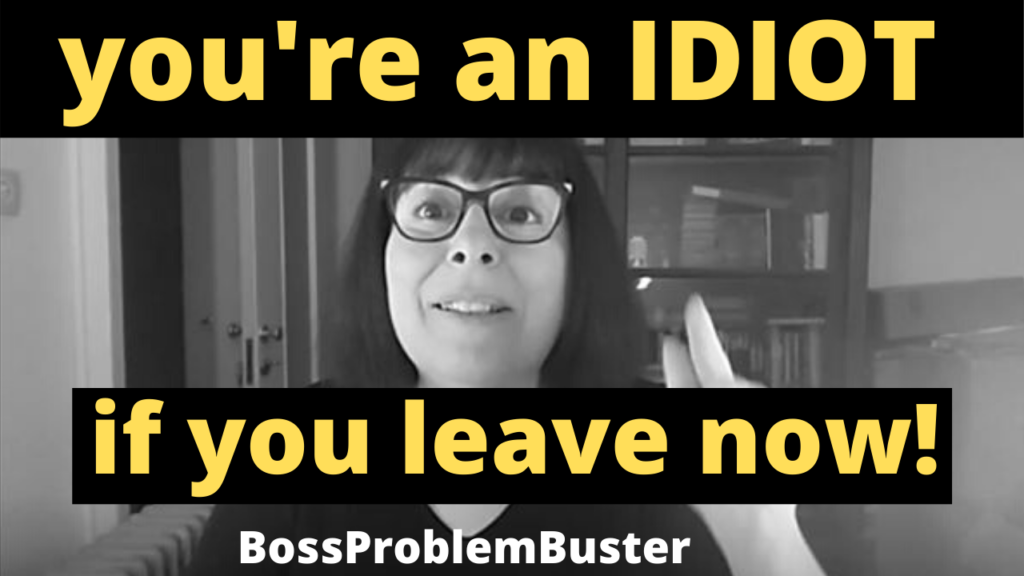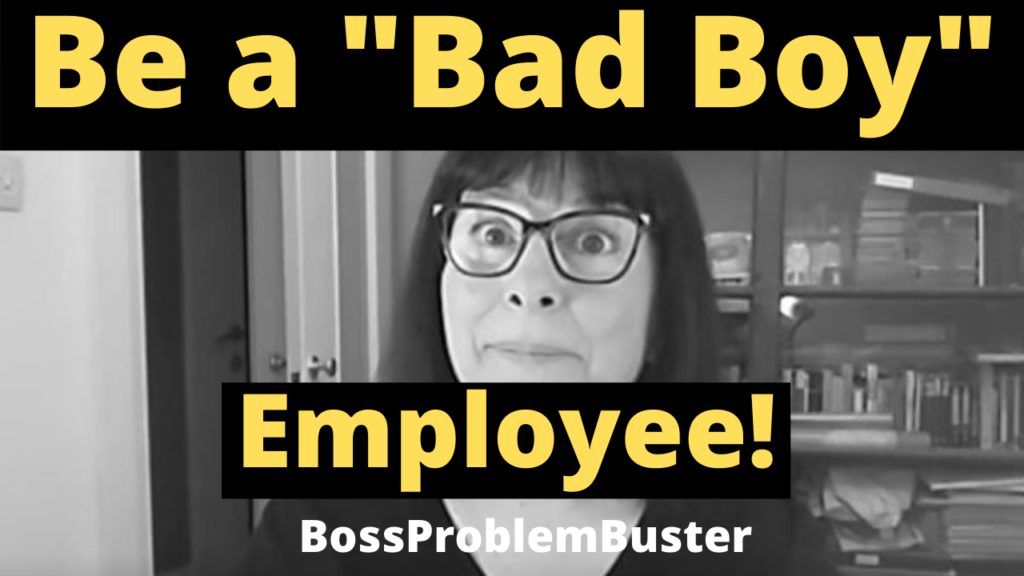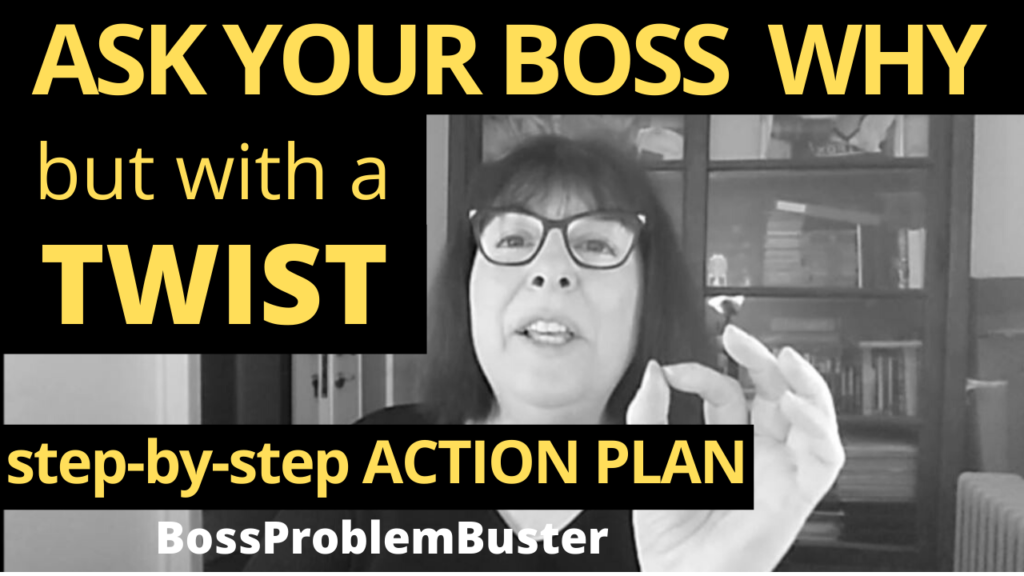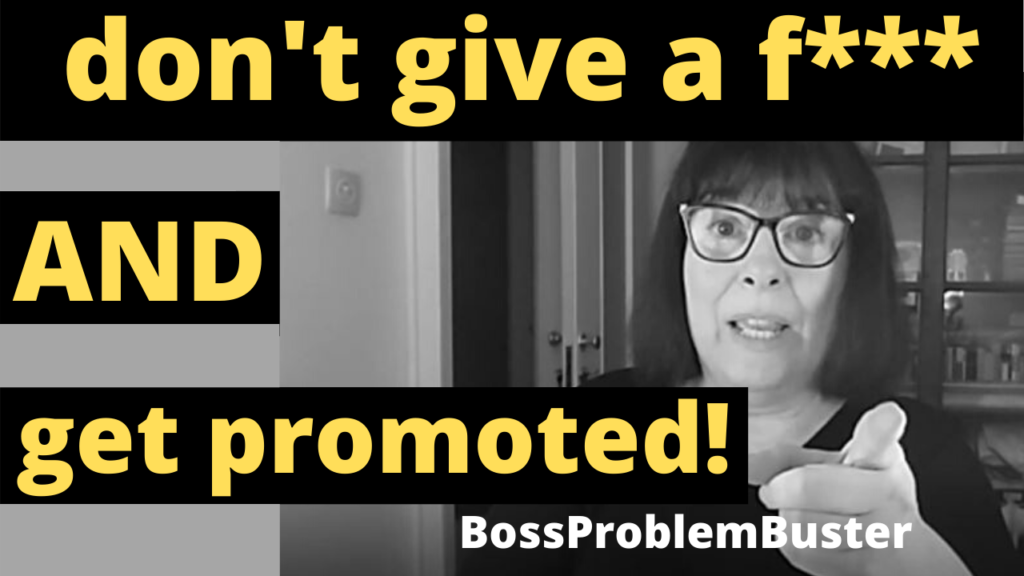part 2 of 6
Passed Over
For a Promotion
& Pay Raise:
What To Do
(and Not Do)
Right After
The Ultimate Guide

Your Emergency Snub Stack
let's bring YOUR inner joy back!
We’ll bust our asses for you
(some free some paid)
but you have to make the first move:
Put in your most frequently monitored email, NOW
and get us on you’re side!
(no, no freebie – you don’t need a bribe – you need results!)
part 2 of 6
Crack Your Boss'
Psychology
& Use It
To Get What You Want!
TLDR
(you’re welcome!)
Your boss dreads you
after snubbing you -
use it!
How?
By being a "Bad Boy" employee!
watch / read to find out why and how
What does your boss have in common with the all-powerful Wizard of Oz?
A LOT!
Passed Over for Promotion & Pay Raise:
What To Do (and Not Do)
Right After
to Get Another Shot
The Ultimate Guide
Crack Your Boss’ Psychology
& Use It To Get What You Want!
Let me tell you a secret, no employee knows or understands:
your boss is anxious about you not being promoted, just as you are – maybe even more!
Yes, I’ve said “more”. I know it sounds odd, but it’s true! (don’t kill the messenger – I’m just giving you the facts nobody else will)
How do I know? Well, 24 years of working with bosses just like yours, and seeing things from their point of view, this is how!
So in this 2nd part of this e-book, I will:
a. Prove it to you and
b. Show you how you can use it to your advantage!
So here it is: After deciding against you (with that promotion or pay raise or both) your boss dreads (dreads, no less) the moment of passing you in the hall, having to look you in the eye and make small talk, Or worst (from his perspective): the moment YOU will look HIM in the eye and ask “why ??? Why not me??? For crying out loud, how could you pick that loser over me???” (Of course you’d say it differently, but that would be the gist of it). And when you do – he knows he will have to come up with an answer.
So here are the scenarios your boss is running frantically in his head, that cause his anxiety over you:
He could either tell you the truth – which will potentially deflate your motivation and performance,
Or, he could brush you off with some made up, feel good, kumbaya b******* , that will appease you, so that you can all get back to business as usual.
However, both options are dreadful to him. Literally dread-full. How so? Well,
The first option (where he tells you the truth on why he decided to give that promotion, or pay raise, or both, to that other guy and not you) is dread-full to your boss two ways:
Firstly, on a personal level, it is very hard to look someone in the eye and tell them (meaning you) an unpleasant truth about themselves (meaning you again), especially when it is bound to make the relationship awkward – at best – and straight out acrimonious – at worst.
Secondly, on a professional level, when your motivation and performance go down, this reflects negatively on your boss, not 1, not 2, but 3 ways this happens:
First, in his everyday managerial duties: having to deal with you! And who wants to deal with a disgruntled worker?
Then (so this is the second way), there’s the team to deal with: we all know the dynamics within a team are always complex enough as it is, but it gets even more complex when one member (that would be you) is not pulling his weight. And you are not pulling your weight, because you were told the truth, which you didn’t like, which deflated your motivation and performance, which is exactly as your boss suspected and feared!
And then, all of that, in turn, will reflect negatively on your boss, in a third way (probably the most damaging to him): the way his superiors see him!
So he is truly between a rock and a hard place, if he tells you the truth.
The second option your boss is frantically considering (where he bullshits you into appeasement and a business-as-usual relationship), is also dread-full to him because:
Firstly, it is difficult to look someone in the eye and lie to them (meaning you), just as it is telling them the truth.
Secondly, it is especially hard if the employee (meaning you), does not buy the lies and keeps probing further on the why: The more you probe – the more your boss will weave an even more tangled web of lies, than he already has.
And thirdly, even if he manages to somehow appease you, he knows his tangled web of B.S. will 100% come back to bite him.
When?
When the next opportunity presents itself, for a promotion, or pay raise, or both.
Why?
Because when that happens, you will be assuming it’s in the bag, your bag, based on this cockamamie talk, that he’s had with you!
So either way: a dread-full catch 22, which is why your boss is totally anxious about you not getting that promotion or pay raise, or both, just as you are – maybe. Even. More.
Q.E.D.
I rest my case.
Now remember! These are all scenarios your boss is frantically running in his head, which are the reason for his dread. Of you.
Indeed, in his mind you’re the Dread Pirate Roberts no less (and wouldn’t you have loved to be Westley, and win the princess bride…)
Alas, my friend, I’ve prepared a very different role for you today, from an entirely different movie, yet as remarkable: Not as alluring, perhaps, but much more practical for your predicament, trust me:
You will be – wait for it – Dorothy! All lost and confused, thinking her destiny depends on the whim of the all-powerful Wizard Of Oz.
And i will be your little doggy Toto, pulling back the curtain, exposing all the smoke-and-mirrors, behind your boss’ Wizard-Of-Oz appearance of confidence and being-in-control.
What you’ll find, once I’ve pulled back the curtain, will blow your mind, because you’ll realize “you’ve always had the power to go back to Kansas“, and that will make you look at your current conundrum, in a whole new way, you never thought possible!
Sounds interesting? Stick around!
In the previous part, we’ve broken down the 4 crucial Don’ts, right after being passed over for a promotion, and / or a pay raise. So now it’s time for the crucial Dos (what to do), so that you can have the full picture, of both the Don’ts and the Dos, so that you can, with time, completely turn around your current disappointment, into a future success.
And I have so many great insights and tips to share with you – things you probably don’t normally hear – so the dos will be broken into five (!) parts. In this first part, I will drill down deep into your boss’ psychology, after having passed you over.
Turns out it has a huge impact on him, which is something I also have never heard anybody else speak of, or even acknowledge, let alone understand how it plays in your favor, in a surprising, counter-intuitive way, which we’ll cover today.
And in the next parts, I’ll show you how you can actually, practically, use this new-found understanding of your boss’ psychology, to your advantage, because you absolutely can!
Okay let’s get going, we have plenty to cover.
The number one DO (which is the focus of this part) is indeed:
- Understand your boss’ psychology, and how it can work to your advantage.
Now, if you’re like most employees, “Dorothy” (wink wink), you tend to forget that your boss is not as omnipotent, as he seems to be:
Much like the all-powerful Wizard-Of-Oz, if you pull back the curtain, as I am now doing, (remember I’m your little doggy Toto), you find that it’s just some guy, pulling on some levers, and often quite clueless as to what to do, in the face of direct conflict. Just like when Dorothy, who confronts the Wizard, and as you may confront your boss, with the “why not me” question that he so dreads, as we’ve seen before.
This might seem confusing or oxymoronic, but it’s not. Two things can be true at the same time: Your boss did indeed have the power to decide against you (regarding that promotion and/or pay raise). So in that respect, he was all-powerful. But, he himself is constantly subject to a complex matrix of interpersonal and political dynamics, both within his department and outside of it, with peers and superiors.
A crucial part of this matrix is the immense psychological power that a “problematic” or “rogue” or “harder to control” employees have over him – as they do any boss.
I’ve seen it time and time again, to the point that you really come to wonder: Who’s the real boss here? And just like that 80s sitcom, Tony was the one in charge, in more cases than one, not his boss.
Simply put, the more “rogue” an employee is – the more the boss is willing to do to appease that employee, just so that he himself can have some peace and quiet.
[By the way, let me go off on a tangent here for a second.
If you’re wondering why i refer to your boss (and others) as “he”: it’s just time consuming and annoying to keep saying “he or she” and I’m sick of using the PC “they” because it makes for ridiculous sentences, which completely defy basic syntax and grammar – so I’m going with “he” (everything is so tilted towards women nowadays that it seems only fair to let the men have this one).
You know, it’s crazy that it even needs to be addressed, but these are the times we live in, and i just don’t want that to distract anyone from the
issue at hand. So let’s all just keep our eyes on the ball here, which is your boss’ psychology, whatever gender he/she/they may be].
So as I’ve said: The more “rogue” an employee is – the more the boss is willing to do to appease that employee, just for his own personal peace and quiet. This is the paradox nobody understands or pays attention to, which is why we need this long-form drill down.
You may think it is counter intuitive, but actually it makes perfect sense. The only reason why it might seem counter intuitive, is your innate (but false) assumption, that your boss is both capable and willing to confront whomever is necessary, in order to assert his leadership, and to make that employee compliant and easier to manage. (especially someone like you, whom is
in his own department, and under his direct supervision).
You would think that, because that is what he is paid to do, among other things, but this is not the case most of the time.
Most bosses, especially mid-management, for sure lower management, but you would be surprised how often this is true for top management as well, anyway the point is: Most of them would be willing to put up with a lot (and I mean a lot), just to avoid confrontation of any sort. There is a much higher chance – for most bosses – to be either wimps or passive aggressive, rather than true “leaders”, with everything that that entails, or should entail.
And don’t be fooled by all the “leadership programs” they attend – “leadership” is just an overused and misused term, for what is otherwise mostly bureaucratic, administrative, cog-in-the-system mentality, that is needed to perform well in most big organizations.
[Well , “leadership” and, of course, “empowerment”, which is the most prostitutionalized terms ever, but we’ll address that one another time – don’t even get me started on that…]
So from here on, I’ll use “management” rather than “leadership”. It’s just more accurate in the context we’re talking about.
Management is akin to parenthood, with all the obvious differences, and your boss’ dread of you, after having passed you over, is very much akin to parents’ reaction to unruly children.
Think of a family where one kid is a good boy, and the other is a bad boy. The parents energy, focus, and intent will be, naturally, directed towards dealing with the bad boy, with the result of neglecting the good one.
This means, at first, trying to educate him, then disciplining him more and more… but as time goes by, if his rambunctious behavior is still intact, their energy will dwindle, and they will do anything to avoid confrontation with that child, to the point of laxing their demands of him in terms of house rules, chores, and general behavior, even at the expense of their parental values.
So for example, their parental, educational value may be (in terms of behavior) to insist the boy addresses adults politely, both at home and at school – which is a great educational value – to show respect, but in practice, they would look the other way when the bad boy is being disrespectful to them, or to uncles and aunts and teachers, just out of exhaustion and fear of turning yet another mundane situation into a full blown tantrum…
And anybody who’s ever dealt with kids, knows exactly what I’m talking about.
So now, the whole family dynamics are flipped – a complete 1-80: Not only is the bad boy catered to and constantly appeased by his parents, but also, the good boy is getting all the discipline!
Furthermore, the parents’ nerves are so frayed at this point, that the good boy is being disciplined for every minor infringement, that would have
otherwise gone either not noticed or noticed but not retaliated.
So the good boy is being disciplined even if he doesn’t deserve it, and when he does deserve it – to a harsher degree than his behavior warrants!
It’s all topsy-turvy!!!
And if you’re into a Freudian take on it, one may suggest that the parents are much harder / harsher with a good boy as an overcompensation for their failure with a bad boy, and as a means of channeling they’re own growing frustrations and hostility. Keep this in mind – it will relate back to your boss later on.
Now, it may seem that we’ve digressed there, but no – let me assure you this is right on topic, because this is the professional, and political, and personal, and psychological context your boss is functioning in, and if you want to get ahead at an office that he’s running, you need to understand it. Thoroughly.
Plus, I did promise you a deep drill-down into your boss’ psychology, and that’s exactly what we doing. So in this family analogy, the parents are obviously your boss, but you might be wondering which of the kids you are: The good boy or the bad boy?
This will become clear later on, so hang in there. It will totally be worth it, I promise!
So, to wrap up this example, the most important and pertinent-to-your-situation point here is: Understanding why and how this unfair and completely up-side-down dynamics are possible. The answer is quite sobering, if not completely depressing, if you stop to think about it: It is possible only because the parents know the good boy will comply. The disciplinary action would go uncontested, even if somewhat protested. In other words, the good boy gets the shorter end of the stick just because his parents do not fear a retaliation from him.
So the paradox is: If you are a “good boy” in the sense that you are not feared- you lose.
[A bit of a dramatic pause here is warranted]
Now, does it mean that you need to be uncontrollable? Impossible to deal with? Unpleasant? An a**hole? Of course not! God no! It does mean, however, that being too “vanilla” will get you tossed aside too easily, every time, for sure.
“Vanilla” doesn’t make the cut! You should mix in some stronger flavors to create a more robust office persona.
And obviously you need to have a level of sophistication here to do it right: It’s all about subtleties, and degrees of subtleties… I’ll address that more in the next part.
Also, there’s a huge caveat that comes with all that, so please listen carefully: (like that song from the 60s: Don’t Let Me Be Misunderstood) Do not twist this into some cop out as to why you actually lost that promotion, or pay raise, or both: “Oh poor me… I’m just too good of a person, so they step all over me” [weep weep], “the world is so cruel and unfair”…
Well of course it is! We all know that, but it is irrelevant!
And as I said in the previous master class: This workplace the one you’re in, this is the sandbox you chose to play in, so you need to figure out the rules of how to win in it, or get out and find another send box to play in, one with rules you like better. And I would applaud you for such a move (as long as you do it smartly), and help you, as best I can, to do this transition, but as long as you choose (I’m big on personal responsibility as you can tell, by now) so as long as you choose to stay where you are – be it out of convenience, or fear, or whatever it is – I don’t want to hear any bitching about how supposedly “unfair” your workplace is!!!
OK, time to put everything together. Your boss is akin to those parents with the “good boy” and the” bad boy”.
The good boy – let’s now call him the good “employee” because we want to apply the analogy to your workplace reality – so the good employee is good (from the boss’ perspective, which is the whole point of this whole Masterclass) – he is good in the sense that the boss does not dread him, and does not expect any overt objection, or any sort of retaliation from him (the “good employee”) in terms of damaging the work in some way in reaction to the boss’ decisions.
And this lack of dread is true, even when the boss’ decision is to pass over said “good employee”, for a promotion, or a pay raise, both.
The flip side is that the boss does dread the bad boy – let’s now call him the bad “employee” – in regards to his possible reaction to every move the boss makes, as his boss:
Will there be a tantrum?
Will there be a delay in deadlines?
Will bad employee incite others in the team against the boss?
Which brings us full circle to where we started: The different scenarios your boss is frantically running in his head, because he does not know whether you are going to be a “good employee” or a “bad” one, after being passed over by him, in terms of:
how subdued or vocal your reaction would be,
how implicit or explicit your disappointment will be expressed,
and
weather you would keep it between yourself and him (the boss), or try to drag
as many people-in-the-team in, as possible…?
And because he does not know which of those scenarios you’re going to play out, he dreads you, and has anxiety over you not being promoted (by him), just like you do, and maybe even more. So once again: Q.E.D.
Furthermore, this is why your boss – as any other boss, to be fair – will always [listen closely] he will always take the “good boy/employee” for granted, trusting that that front is secure for him, while constantly trying to appease the “bad boy/employee”, in order to divert himself from any potential conflict, that is always on the horizon, with the “bad boy/employee” in his team.
And actually, if you stop to think about it, you’ll see this paradox is true for every facet of life, not just work: Relationships, family, friends – the lot!
So, “Dorothy”, now that your little doggy Toto has pulled back the curtain on your boss’ psychology (just as promised), you understand how and why, your boss is much more vulnerable than you might have originally thought him to be: So, not the all-powerful Wizard-Of-Oz, but just some guy, pulling on some levers, quite clueless as to what to do, in the face of direct or even potential conflict.
Indeed, as you are going through your five stages of grief: Denial, anger, bargaining, depression and acceptance, as the famous psychiatrist Elisabeth Kübler-Ross postulated, your boss is going through 5 stages of his own, and here they are, as per my observations over the years:
(We’ve actually already touched on most of them, but let me just wrap it up nicely for you now).
The first stage is anxiety.
This is true especially if you were indeed a valid contender (for that promotion or pay raise or both). The more valid you were – the more anxiety your boss experiences, at the time leading into the decision, while making it [which, by the way, he probably would have liked not to fall on his shoulders at all], and right after making the decision to pass you over.
And it’s easy to understand why: The closer the race was – the more difficult it was for your boss to choose.
Which of course begs the question: What was the tipping point against you, if indeed it was a close call, or, if it turns out it wasn’t a close call – why wasn’t it so?
And worse yet: Why did you think it was – when it wasn’t???
Many heavy issues we need to seriously drill down into in the future, as we most definitely will. I’m actually writing a book about it – there’s so much to say…
But for now, let’s go on with the 5 stages your boss goes through after having passed you over:
No. 2 is Monitoring .
This is a highly alert and tense time for your boss, as he carefully observes your reaction, and its influence on everybody else’, within the team.
Especially, monitoring the tension – either implicit or explicit – that is bound to exist between you and the one who got “your” promotion, plus the whole office political dynamics, as a result of that.
All that, while wishing that you will either curb your emotions as much as possible, or that if you do express your disappointment explicitly, that it will be manageable and not distract the team too much, from its needed performance.
And now, the road bifurcates:
If it turns out that you are indeed subdued
[whether truly subdued or just passive aggressively so is another matter, but at this point you poor boss will gladly take any form “subdued”], so if you’re subdued, and if the impact on the political, and professional, and interpersonal dynamics within the team, is minimal:
Then the next 3 stages he would go through to complete his cycle of 5 are, what I call, the 3 R’s:
Relief,
Reassurance on his decision not to promote you but that other guy,
and Resumption of business as usual.
This is what your boss hopes happen. In other words, this would happen if you turn up to be a “good boy”/employee.
However, if you’re not as subdued in your reaction to being passed over, as your boss would have hoped, then he goes through a totally different set of 3 steps. These would be:
Stress:
Wondering how difficult it is going to be? How long it will last? How it will affect the team’s deliverables?
Appeasing:
Working out a way to give you something as a consolation prize.
And lastly, Containing:
Lowering the flames enough so that he will have bought himself some more time to find another opportunity for you, as a compensation for having failed you the first time.
In other words, this would happen if you turn up to be a “bad boy”/employee.
So, now that you know, as promised (I always keep my word), which do you prefer to be: The “good boy”/employee, or the “bad boy”/employee?
Get notified
so that you can bring YOUR
inner joy back!
when a new video / post is uploaded
(not too often, just right)
you’ll get the link delivered to your email
so that you don’t miss on the insights and tools
that can kill your Monday blues once and for all!
So if you’re serious about getting YOUR inner joy back –
Put in your most frequently monitored email, now:






